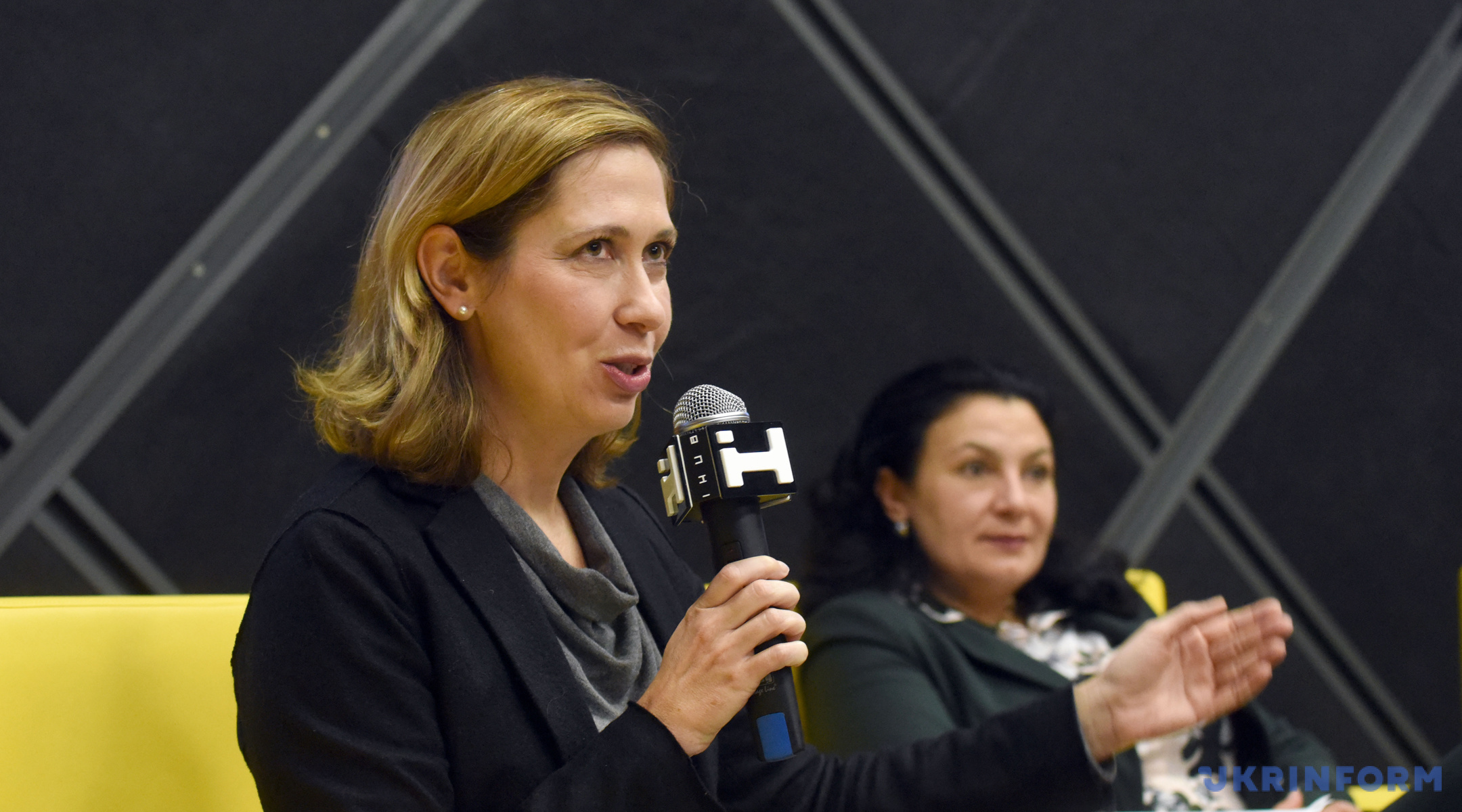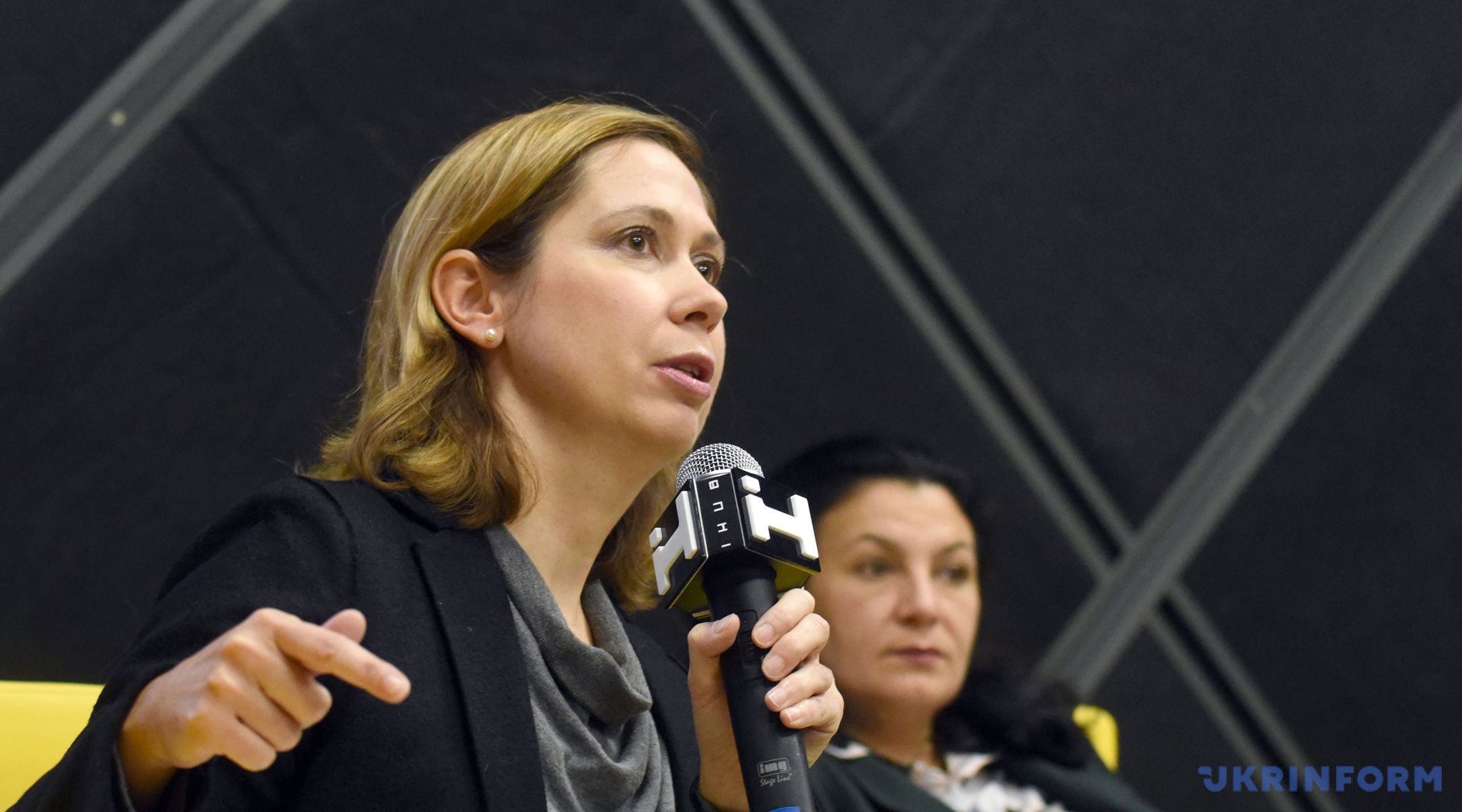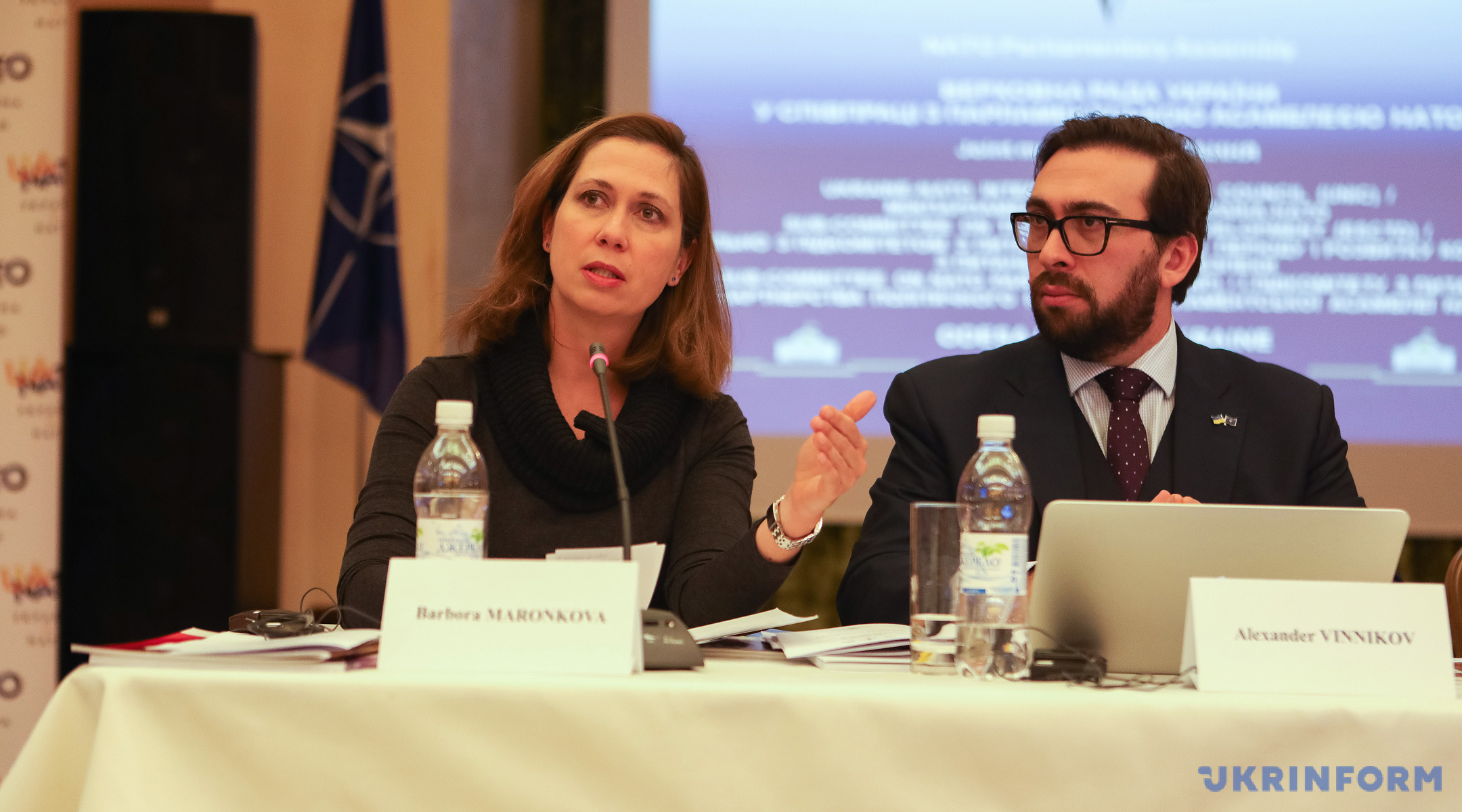It would be fair to say that Barbora Maronkova, a professional Slovak diplomat and now Director of the NATO Information and Documentation Center in Kyiv, represents a new generation of North Atlantic alliance officials who are dealing with tough and complicated challenges of modern transatlantic security. Maronkova spoke with an Ukrinform correspondent about how to represent NATO in Ukraine at a time when our country is fighting for democracy and its own existence, how to look at things in the broader context and how to resist Russian propaganda.
Question: According to recent polls conducted by Moscow's Levada Center, a third of Russians believe they are surrounded by enemies. NATO holds fifth position in this rating along with Germany and Britain, after the U.S., Ukraine, the EU, and "post-Soviet" countries. What kind of emotions could this fact possibly bring to you – disappointment, fear, or some other feelings?
Answer: To be on the fifth place is not as bad as we could have expected (smiles). But, obviously, this is not a "beauty contest" ever. NATO and Russia are now going through a very difficult phase in our relationship, perhaps, the worst since the end of the Cold War. There were times in our modern history that we both thought could lead to the improvement of our relationship. We have established NATO-Russia Council. We have had common projects in different areas of military cooperation. We worked together in different initiatives, for example, in Afghanistan etc. But these all have been postponed, or canceled, or suspended after 2014 events in Ukraine.

As our Secretary General [Jens Stoltenberg] has just recently said after a meeting with [Russian] Foreign Minister Lavrov on the sidelines of the UN General Assembly in New York that even in the most difficult periods we need to look for dialog, we need to talk, because there are a lot of areas where we need to find ways to communicate. To relief tensions that are with us in particular areas, for instance, big exercises, or events in the Baltic Sea, or in the Black Sea, in the water, in the air, wherever some collisions would be possible, we need to be able to talk to each other.
But we also need to continue telling Russia that we do stand firmly by Ukraine. By Georgia, by Moldova, by any other partners, which are being aggressed by Russia in different ways. This is our policy with Russia – of dialogue, but at the same time strong defense and deterrence.
Q: It looks like Russian propaganda currently becomes even more aggressive than before. How could it be possibly reflected in countermeasures by NATO or Europe?
A: That is important – NATO and the European Union, all our allies, together with Ukraine, Georgia and other countries, have really stepped up their efforts and awareness about disinformation, about propaganda that has been coming from Russia for the last four years. It was even before but increased since 2014.
Our proactive, open and transparent communication, in showing facts and figures, in using different methods to show and debunk the myths that Russia are using, are hopefully useful. People start to realize that what matters are facts, that everyone could find easily in the modern world, if he or she really wants to. You don't have to just believe to everything that has been said.
In this regard, we have learned a lot from Ukraine, as Ukraine has been very vocal in coming to European capitals, in coming to Brussels, to different events, showing us different myths and propaganda that was done by Russians on Ukraine. Giving us very clear examples of how this is done, and that also helped to raise our own awareness.
I remember, as early as in February 2015, I was holding an event in Brussels on public diplomacy. We invited representatives of stopfake.org from Ukraine, and they had a thirty minutes presentation, where they really pulled together all different stories and video, and social media of Russian propaganda against Ukraine. It was really an eye-opener for many people in the room. I think, these efforts, of Government institutions, NGOs, individuals, journalists - all of them - have really been helpful in addressing this issue.
Q: How dangerous is Russian propaganda for European countries? One of the aims openly declared by some Russian political actors is to dissolve the EU and destroy NATO. How could "the Big West" possibly react to such threats?
A: We are very much aware what the goal is. And that is to erode trust in our Organization and in democratic principles functioning in each individual member state. Now there is much greater awareness in European capitals, awareness by politicians, decision-makers, by overall citizens and societies. And among journalists… There are a lot of journalists interacting with each other in different social media groups, and they share between each other different information, data on disinformation, they try to debunk themselves for the sake of their people.
We have witnessed different parliamentary hearings in different countries, in Brussels, in Berlin, in Washington and elsewhere. Some Governments prepare manuals on disinformation for their citizens. Recently we have received very interesting materials in France, on how to protect yourself against disinformation.
So, we do agree that this is a very dangerous part of a broader hybrid warfare and tactics, which are used against our democracies. At the same time, I think, the prevention and deterrence also on information warfare sphere are growing in each and every capital. This discourse is very much alive in many countries, which, as I believe, is a good thing.
We are often asked to come and speak on different conferences, to write different articles from my colleges in Brussels. We also have very strong institutions which are helping us a lot, and that's NATO Strategic Communications Center of Excellence, which is based in Riga, Latvia. It became really the hub for research and analysis of this issue. And together with the European Union. There is the European Center of Excellence for Countering Hybrid Threats in Helsinki where we also see a big effort from many countries who are joining this center to also prepare and look for resilience and defense in this for other states. So, there is a lot of activity ongoing.
Q: Here in Ukraine sometimes we have a discussion – how can we possibly react to Russian propaganda? Russian have created the entire "troll factories" disseminating lies all over the world. Should we, or whoever, react symmetrically, responding to fake by fake, to disinformation by disinformation, or waste a lot of money and feeding an army of trolls?
A: Our basic line on this is very simple. We don't respond to propaganda by propaganda, and we do not believe that it is a right approach. We believe that the facts are the key, and this will prevail. It is very important, because this reflects who we are – we are democratic and transparent societies, and therefore, we will stick to the facts and to the truth. This is really something which NATO leadership underlines very strongly and firmly believes in this.
As I mentioned, we have done several projects how to come to Russian disinformation with true facts. For example, on the NATO website we created a subpage, which is called "Setting the record straight."

Here, we have collected different Russian myths about NATO. And then we looked for the facts, which gave us an answer to these myths. As we believe, this is a very effective way how we can debunk some of these myths.
Also, in Ukraine we did exhibit on NATO-Ukraine relationships, and dedicated one part of this exhibit exactly to the myths, and in an illustrative and creative way we've shown the myths from one side, and then revealed the truth from another side. We think it is a good way for people to realize what kind of information was spread about us.
Another very important part of what NATO is doing in this area is activity of our press and media section. It daily works with journalists all over the world. We really have established very strict monitoring. And if we see or detect a story which is incorrect, or which is trying to blow some lines, we proactively reach out to these journalists, and we give them factual information and ask for corrections.
This really works, including with Russian journalists.
We had a very well-known story like two years ago, when our Secretary General was giving an interview to Rossiya 24 in our NATO TV studio. Then the interview was supposed to be aired, the headline was: "NATO is preparing to attack Russia." Which, of course, was nonsense, Secretary General never said that.
But since it was filmed in our NATO TV studio, we had all the recordings, all audiovisuals of this TV interview. So, we took bits and pieces of this interview, we were sending them out through the social media, put the whole transcript on our website. Our NATO delegations of the member states were also supporting us on their social media. Our reporters, with whom we have very good relations from key worldwide agencies - they were pushing this information by their channels and in social media. All this created such a pressure, because of that, in the end, Rossiya 24 changed the headline and corrected it.
Q: Did they apologize?
A: I do not know, if there was, actually, apology, but the result was that under the pressure we achieved correction of this interview. So, I think, social media is great. But having good contacts with working journalists is also very important. They can help us greatly, and we can help them greatly. This is a kind of symbiotic relationship, which our press officers and NATO spokespersons are working on.
Q: In Ukrainian realities, we have some media that actively use the democratic norms of freedom of speech for spreading uncovered Russian propaganda on Ukrainian soil. They call for defeat and surrender in the fight that Ukraine is currently carrying out against Russian aggression and occupation. That is exactly the way how Russian propaganda works in Ukraine, trying to affect minds of Ukrainian people. From your perspective, how should we react, what could be a solution to this issue? Do you in NATO face something similar?
A: NATO has no certain position on that, as international organization. Broadcasting licensing, permissions to operate to different media in each country is a question of national decision and national legislation. What is important, on the one hand, is to keep the sacral issue of freedom of speech in democratic societies, where media can openly and freely operate. On the other hand, of course, the nations are responsible to protect their own citizens. So, there has to be a fair balance, which is found by lawmakers in each and every country, how to ensure this balancing act. It is very hard, we know that.
There are related or similar legislations in some countries, where, for instance, the licenses are taken away or suspended in case of hate speech broadcasted, or when the journalists or outlets are systematically breaking journalist and ethical code. There are different regulations how to do that, but every country is different. So, we, as NATO, don't necessarily engage in this. But we understand that the issues of freedom of speech and informational protection are very important.
Q: In Russian media there is not only hatred to Ukraine and Ukrainians, but also direct calls for killing, war and violence. All these calls in civilized societies are restricted by law. Are there some legal instruments to bring Russia to account for open propaganda of war in modern Europe?
A: As far as I know, there is some ethical code addressing this issue among journalists and their international organizations, like Reporters Without Borders, for instance, or International Press Association. Again, every country has its own set of legislation on hate speech and on definition of hate speech. The countries of the European Union, for example, are bound by their own regulation in this regard.
But I'm not an expert in this field. It could be better addressed by the Council of Europe, where this issue is raised regularly. We, from NATO side, are trying to increase awareness, how distractive and pervasive such propaganda could be. The level of such awareness, as we see that, has substantially increased for the last four years.
So, it is for Ukraine and Ukrainian lawmakers to look how this issue could be solved, preferably, according to European standards and European legislation.
Q: Not so long ago, Ukraine started to introduce the system of strategic communications. From your observation, is this process somehow successful here?
A: I think, an issue of strategic communication overall has been brought up to light not only in Ukraine, but in many other countries, including in NATO, in very recent years. Still it's fairly new terminology and a fairly new think, which was not before used, except a number of countries. It was mainly created for coordination of military public affairs, and coordination among militaries on communication.
In NATO we've created our own strategic communications system, it was basically originated on our engagement in Afghanistan, and we worked on its perfection to what we have today.
For Ukraine, we are really witnessing a great interest in this subject and deem to increase understanding among government structures and officials, representatives of ministries and agencies, who really are interested in that strategic communications. They come to us and ask for advice, assistance in setting up their own strategic communications cells or teams. They ask for training opportunity, for sharing of the best practices.
The NATO Information and Documentation Center is actually mandated to support Ukrainian institutions in developing strategic communications capabilities. We have a strategic communications roadmap, which was signed in 2015 between the head of the National Security and Defense Council of Ukraine and the NATO Secretary General. We do have a document, which binds us together, to support Ukraine in this process.

A lot of work has been done and achieved, StratCom structures were created in many institutions. They initiated adoption of necessary legislation. They have even trained their personnel and engage actively both inside and outside Ukraine, in international fora. It's really great progress in four years.
Strategic communications – it sounds complicated, but in fact it is very simple. It is about being coordinated and about speaking in one voice. It is very important to understand what you really want to say, whom is your message to. And then everybody, in their own words, but will spread the same message.
This is one of the areas of our reform assistance to Ukraine from NATO, and we are happy to assist in such development. Ukraine is working hard on it.
Q: Devil is hiding in details, not in a mandate. So far, there is a different understanding of StratCom among Ukrainian officials. Is it a communication tool between government and society or an instrument to protect interests in the sphere of communications and information security?
A: Different government institutions communicate themselves to society on a daily basis. If we look at a strategic part of communication, that means that all the decisions which are taken on a strategic level by high-ranking people they already, from the very beginning, contain an aspect of communication. This is coming down to tactical level, where people know what "big bosses" have discussed at a round table and how they communicate this message.
NATO has its own definition for strategic communications. For us it is a collection of different communication functions: public affairs, military public affairs, public diplomacy, information operations, psychological operations – and all of these functions are coordinated in support of achieving our goals and policies. Again, this is a NATO definition, reflecting who we are as a political-military organization. Each country should make its own decision, what definition of StratCom is the most suitable for them.
Q: How to prevent the usage of sensitive tools, for instance, information operations, not for military purpose, but for manipulation with civil society?
A: Again, it's for each individual country to decide. We, as NATO, have very strict rules of engagement as to where, when and who can use information operations or psychological operations. Usage for these mentioned is purely for military operations, and we are forbidden from carrying them out on our own populations. This is a very clear rule, a very clear definition. Of course, I cannot speak for Ukraine – how, where and in which way these operations are used or not. It is up to Ukraine and its legislation.
Q: Last question. You, as NATO, assist Ukraine in setting up strategic communications. The most difficult question is how to teach those big and small administrative and political bosses, officials who think they already know everything better than anyone else?
A: That is a very good question, to which we have no answer (smiles). Be sure, it is not only Ukrainian question. Officials and political leaders will always be officials and political leaders. We can only offer assistance if it is wanted, and we would be very happy to help.
Dmytro Shkurko. Kyiv-Brussels
Photo credit: Olena Khudiakova, Nina Liashonok / Ukrinform
